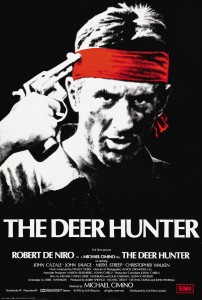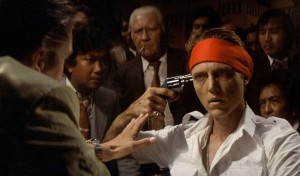In 1978, two major films about the Vietnam War competed for the Best Picture Oscar, “The Deer Hunter” and “Coming Home.” Both films were set in 1968, though they differed substantially in their orientation and style. Michael Cimino’s “Deer Hunter” is more ambitious and multi-layered, dealing with a group of five Russian-American friends and their harrowing experiences in Vietnam and afterwards.
Grade: A- (**** out of *****)
Nominated for 9 Academy Awards, “The Deer Hunter” won 5 major Oscars, including Best Picture, Best Director (Michael Cimino), and Best Supporting Actor (Christopher Walken). Before winning the Oscar, “Deer Hunter” swept most of major critics awards, including the New York Film Critics Circle.
The story starts with ordinary life in a small Pennsylvania steel town, then sharply switches to Vietnam. It deals with male friendship and camaraderie, survival of ordeals, violence in political and personal contexts, and family life. There was no doubt that the picture was stronger in its lyrical-expressive imagery than in its story or ideas.
Cimino’s drama concerns three Pennsylvania steelworkers whose lives are shattered by their Vietnam experience. The three are about to enter the service to fight in Vietnam following the wedding of Steven (John Savage), the youngest and most pliable of the trio. Michael (De Niro), the reticent member of the trio, likes hunting and seems awkward around women. The third member, Nick (Christopher Walken), is the liveliest and the most sensitive; he confides to Michael that when they hunt he goes along only because he likes the trees.
The first part of the film explores the comradeship of this tightly knit group during the wedding of Steven and Angela (Rutanya Alda), who’s already pregnant. A banner in the wedding hall reads: “Serving God and Country Proudly.” Following the wedding, Michael and Nick are alone in an empty street where the conversation turns to Vietnam. “Whatever happens,” Nick tells his friend Michael, “Don’t leave me there. You gotta promise.” The next day, they are joined by other friends on a hunting trip, during which Michael stalks and kills a deer in a long lyrically haunting sequence.
In Vietnam, the three friends are captures and forced to engage in Russian roulette while their captors bet on the outcome. The hunter initiates a plan of escape by turning the pistol on the enemy soldiers. They make it back to Saigon, where the other two are hospitalized. The torture has shattered the lively one who goes A.W.O.L. Meanwhile, the newlywed loses both legs. The hunter is discharged but returns to search for the A.W.O.L. friend. He finds his friend playing Russian roulette for money and drugs. As He places the revolver to his head, the hunter pleads with him to return home. But it is too late. Michael watches as the gunfires into his friend’s temple.
Back again in Pennsylvania, Michael attends the funeral along with other close friends. Later, in the back room of the local bar, where the small group is assembled, they all are at a loss for words. They then slowly break out in a chorus, singing “God Bless America.” Was the closure ironic Obviously not for Cimino, who thought that this was a genuinely patriotic expression of faith in the country–despite the horror and price of Vietnam.
From its earliest showings, the film was stalked by controversy. Some critics attacked the stereotyped depiction of the enemy as a throwback to Hollywood’s World War II films, in which all the Japanese as vile and sadistic. Others objected to the distortion of history, claiming that the film was “a criminal violation of the truth,” singling out its images of all non-Americans as corrupt and depraved. Still other critics attacked the principal metaphor for the insanity of war, the game of Russian roulette, as entirely fictitious. However, the film has as many supporters who found the work powerful and emotionally moving.
In 1978, the troubled legacy of Vietnam fueled the two front-runners in the Oscar race: “Coming Home,” in which a disabled vet confronts indifference and impotence, and “The Deer Hunter,” which probed the darker recesses of the mind in chronicling how a trio of steel-worker buddies were damaged by their tour of duty.
“The Deer Hunter” confronted audiences with the brutality of war in an intense, unprecedented manner. If “Saving Private Ryan” provided a revisionist view of WWII, “The Deer Hunter” fanned the already white-hot debate about America’s involvement in Vietnam.
Oscar Context
Allan Carr, hired by Universal to promote “The Deer Hunter” among Academy voters booked the film for one-week engagements in New York and Los Angeles, which was unconventional at that time. To create a buzz, he screened first in New York for influential critics and journalists. The Los Angeles screenings were strictly for Academy members and special invitation-only audiences. Then, Universal pulled the film from circulation.
When the Oscar nominations were about to be announced, Universal released the film nation-wide, amidst rave reviews. Moviegoers who had already heard the raves, were eager to see it. Carr’s planning was rewarded with nine Oscar nominations, including Best Actor (De Niro), Supporting Actor (Walken), and Supporting Actress (Streep), Director, and Original screenplay. The film won five awards, including Picture and Director, while anti-“Deer Hunter” protesters clashed with police outside the auditorium.
The triumph of Deer Hunter represented the culmination of a decade in which the majors gave filmmakers the kind of creative latitude not seen since. Deer Hunter and Malick’s Days of Heaven were released at a time when maverick directors, such as Francis Ford Coppola, Martin Scorsese, Bob Rafelson and Paul Schrader were producing their most daring and personal work.
Terrence Malick earned honors from the National Society of Film Critics and the New York Film Critics Circle for “Days of Heaven,” an “impressionistic tale of a fractured love triangle in turn-of-the-century Texas — that had the most heads turning to recognize a work of unforeseen audacity.” At Oscar time, “Days of Heaven” only earned four nominations, winning just one for cinematography.
While De Niro lost the Oscar to Jon Voight’s paraplegic vet in Coming Home, his nomination in 1978 was his third (1974, “The Godfather” win for best supporting actor; 1976, “Taxi Driver,” a nomination for best actor). Since then he has won another Oscar (1980, “Raging Bull”) and been nominated several times. Voight’ win reaffirmed the Academy’s tendency to favor actors who played mentally or physically disabled characters.
Meryl Streep was a nominee in 1978 for “The Deer Hunter,” and has since won three Oscars: Supporting Actress for “Kramer Vs. Kramer” in 1979 and Best Actress for “Sophie’s Choice” in 1982 and Best Actress for “The Iron Lady” in 2011.
Cast
Robert De Niro as Sgt. Michael “Mike” Vronsky.
Christopher Walken as Cpl. Nikanor “Nick” Chevotarevich.
John Savage as Cpl. Steven Pushkov.
John Cazale as Stanley (“Stosh”)
Meryl Streep as Linda.
Shirley Stoler as Steven’s mother
Chuck Aspegren as Peter “Axel” Axelrod
Rutanya Alda as Angela Ludhjduravic-Pushkov
Amy Wright as Bridesmaid
Joe Grifasi as Bandleader













